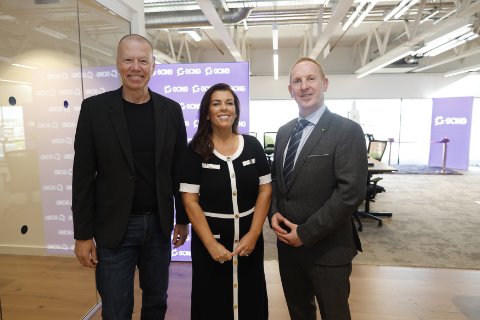An international group of researchers are using the power of AI to learn more about ALS, which could help find new treatments or even a cure.
ALS (Amyotrophic Lateral Sclerosis) is a progressive disorder and the most common form of motor neurone disease. It causes a range of debilitating issues from twitching and cramping of muscles to the loss of control of motor function and eventually, paralysis and death. There is currently no cure for the disease and life expectancy after diagnosis is short – averaging only two to five years, though some patients live for many years.
By using AI, researchers from the University of St Andrews and the University of Copenhagen have uncovered new insights about the disease and how it progresses.
Their study suggests there are specific cell circuits that are affected early on by the disease, while other circuits are affected later as the disease progresses. These specific cell circuits control movement in the body and are affected before the motor neurons start to die.
“In healthy individuals, these cell circuits are required to perform movements as walking and running,” said Prof Ole Kiehn, co-author of the study. “There are specific cells, called inhibitory or excitatory interneurons, which control different aspects of movement by activating motor neurons.
“We found that some of these cells are affected at different stages of ALS, with the inhibitory interneurons being affected early on and the excitatory ones being affected later during disease progression.”
To make this discovery, the researchers developed an AI-based method to identify the cell types contributing to the disease – cells in the spinal cord tissue specifically. Dr Roser Montañana-Rosell, first author of the study, said these different cell types are “intermingled” within the spinal cord and are “often difficult to investigate simultaneously”.
“The computational approach we developed allows to overcome these limitations, while shedding light on potential new targets for treatment,” Montañana-Rosell said.
The researchers have made their method accessible online and hope that it will help with the completion of similar studies.
Last year, Trinity College Dublin’s Dr Lara McManus spoke to SiliconRepublic.com about her award-winning biomedical research, which aims to improve outcomes for people living with motor neurone disease.
Leigh Mc Gowran
This article originally appeared on www.siliconrepublic.com and can be found here.
ALS (Amyotrophic Lateral Sclerosis) is a progressive disorder and the most common form of motor neurone disease. It causes a range of debilitating issues from twitching and cramping of muscles to the loss of control of motor function and eventually, paralysis and death. There is currently no cure for the disease and life expectancy after diagnosis is short – averaging only two to five years, though some patients live for many years.
By using AI, researchers from the University of St Andrews and the University of Copenhagen have uncovered new insights about the disease and how it progresses.
Their study suggests there are specific cell circuits that are affected early on by the disease, while other circuits are affected later as the disease progresses. These specific cell circuits control movement in the body and are affected before the motor neurons start to die.
“In healthy individuals, these cell circuits are required to perform movements as walking and running,” said Prof Ole Kiehn, co-author of the study. “There are specific cells, called inhibitory or excitatory interneurons, which control different aspects of movement by activating motor neurons.
“We found that some of these cells are affected at different stages of ALS, with the inhibitory interneurons being affected early on and the excitatory ones being affected later during disease progression.”
To make this discovery, the researchers developed an AI-based method to identify the cell types contributing to the disease – cells in the spinal cord tissue specifically. Dr Roser Montañana-Rosell, first author of the study, said these different cell types are “intermingled” within the spinal cord and are “often difficult to investigate simultaneously”.
“The computational approach we developed allows to overcome these limitations, while shedding light on potential new targets for treatment,” Montañana-Rosell said.
The researchers have made their method accessible online and hope that it will help with the completion of similar studies.
Last year, Trinity College Dublin’s Dr Lara McManus spoke to SiliconRepublic.com about her award-winning biomedical research, which aims to improve outcomes for people living with motor neurone disease.
Leigh Mc Gowran
This article originally appeared on www.siliconrepublic.com and can be found here.



